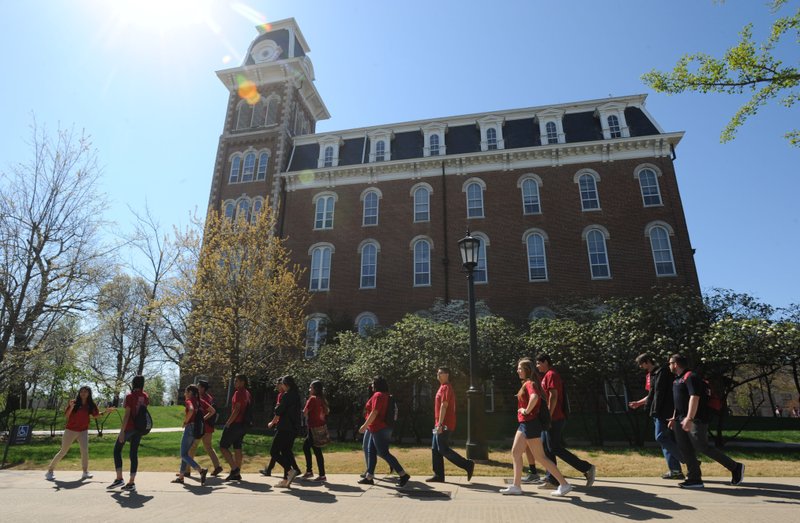FAYETTEVILLE -- Three broadly defined avenues of research tied to health, sustainability and data analysis have been announced by the University of Arkansas, Fayetteville in an effort to forge a standout identity and prioritize collaboration.
Described by UA as "signature research areas," they are: Harnessing the Data Revolution; Enriching Human Health and Community Vibrancy; and Promoting a Resilient and Sustainable Future.
Together they will "highlight the role of research and discoveries at the U of A in a way that distinguishes us from other institutions at the national and international level," Jim Coleman, UA's provost and executive vice chancellor for academic affairs, said in a statement Tuesday.
The focus areas "will also facilitate the development of a critical mass of researchers in these areas to create synergies and build competitiveness for large, collaborative grants and contracts," Coleman said.
They encompass emerging disciplines where attracting faculty can be very competitive, such as data science. Researchers at UA in fields related to the announced areas said the effort could help with recruitment, as well as clarify goals for current faculty.
"From my standpoint, I like how it's been written," Raj Rao, head of UA's biomedical engineering department, said of the human health research signature area, adding, "We need to be addressing issues of human health that are relevant to the community and society."
Rao said he was not part of the 18-member committee that worked on identifying the signature areas. Chancellor Joe Steinmetz, in a statement, called the committee's work "an integral part" of strategic planning.
In November, UA announced a $23.7 million gift from the Walton Family Charitable Support Foundation supporting research, including $5 million for faculty hiring.
The UA announcement Tuesday stated that along with new hires, the campus will host interdisciplinary workshops and a "signature area" lecture series.
Susan Gauch, a UA professor in computer science and computer engineering, said she's worked to recruit faculty to the university, including data science researchers.
"One of the questions that they frequently ask is, 'What are the focus areas of the university?" Gauch said, adding that it will be "really good to say, 'This is one of the signature areas.'"
Recruiting data science faculty is "extremely competitive," Gauch said.
"You're not just competing with other universities. You're competing with industry," said Gauch, a core faculty member of UA's Institute for Advanced Data Analytics, an interdisciplinary effort created in 2016.
In September, the university invited three data science researchers to interview for a position, but the search remains in progress, said Camilla Shumaker, UA's director of science and research communications.
Other public universities have recently begun major data initiatives. The University of Virginia this month announced a $120 million gift from the Quantitative Foundation to establish a School of Data Science. The University of Texas at San Antonio also has announced plans for a School of Data Science with help from a $15 million gift announced in September.
In Arkansas, data analytics has been highlighted by Gov. Asa Hutchinson as an area of focus for the state, and included as part of the State Science & Technology Plan, said Mike Preston, executive director of the Arkansas Economic Development Commission. Preston served as co-chairman for a commission that studied data analytics as a way to help the economy.
UA, by including data in a signature research area, "is right in line with what we are hoping to accomplish in part by building the state's research capacity," Preston said in a statement. Hutchinson has talked about building public-private partnerships, and the UA announcement Tuesday also referred to boosting such partnerships.
Marty Matlock, executive director of the UA Resiliency Center established last year, said the center's projects are interdisciplinary, including work with the UA Community Design Center on locally sourced food planning. The concept of resiliency comes from ecology, but can be applied to business, engineering or other areas, Matlock said.
The sustainability signature research area "reaffirms the university's longstanding commitment to these issues," Matlock said.
UA tops the state in total research expenditures with $157.8 million spent in the 12-month period that ended June 30, 2017, according to the most recent data published by the National Science Foundation. The total includes research activity tied to the Arkansas Agricultural Experiment Station, a part of the University of Arkansas Agriculture Division.
Nationally, UA ranked 128th in research expenditures, up for the third consecutive year but lagging reported expenditures by some similar public universities such as the University of Kansas, Louisiana State University, the University of Missouri, Mississippi State University and the University of Tennessee, according to the data from the National Science Foundation.
Metro on 01/30/2019
